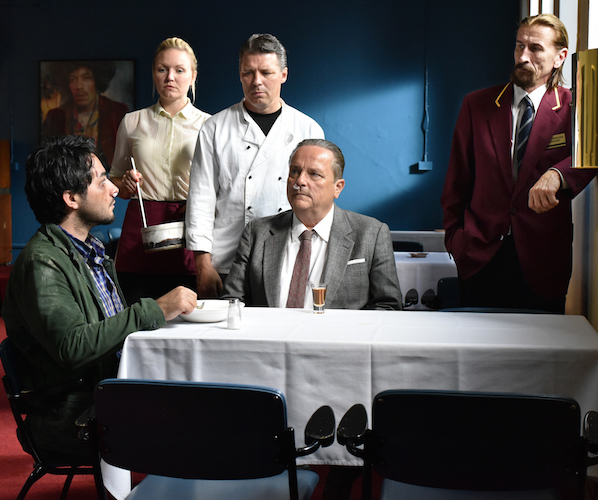Film Review: “The Other Side of Hope” — Despair Begets Compassion
This short film exudes a lighthearted, breezy energy that belies the seriousness of its subject matter.
The Other Side of Hope, directed by Aki Kaurismäki. Screening at the Kendall Square Cinema, Cambridge, MA.

A scene from “The Other Side of Hope.”
By Peg Aloi
This funny, quirky Finnish film is a thoughtful story of two Europeans whose lives merge together when both embark on new paths. Written and directed by Aki Kaurismäki (whose Le Havre and The Man Without a Past were both well-received), this tale of a Finnish businessman and a Syrian refugee comes off as comically absurdist at times, which softens narrative’s grueling reality. Khaled (Sherwan Haji) stows away on a tanker and winds up in Helsinki; he immediately turns himself in to the authorities and applies for political asylum. Alongside his tale is the story of another lost man, Wikström (Sakari Kuosmanen), a middle-aged shirt salesman who silently walks out on his wife (who sits smoking and drinking laconically and silently removes her wedding ring in response), sells his business, and buys a seafood restaurant that looks like it’s stuck in the 1970s, complete with loyal but lackadaisical employees along with a well-loved house band of hipster cowboy folkies. (By the way, the film’s soundtrack is terrific; we are given earfuls of the vivacious live musical performances that permeate everyday life in this world class city.”
As Khaled patiently and bravely endures the naturalization process, hoping his application for asylum will be approved, Wikström good-naturedly embraces his new life and tries to make the restaurant profitable. His strategy includes a very wrongheaded and hilarious attempt to turn the place into a sushi restaurant. The business withstands stabs at change; it is a time capsule of tacky hunting tavern décor and cloudy glassware. But it has its regular patrons, so pretty soon Wikström finds a routine and embraces it.
Meanwhile, Khaled sits in a detention center, waiting; he befriends other refugees who are also uncertain about their futures. Harrowing memories of warfare, genocide, and the loss of homes and family members bind these escapees together in a tangled yarn of shared woe and optimism for a better life. Khaled is trying to locate his sister back in Syria; he has very little information and no phone of his own to make inquiries. He is grateful for the kindness of those who help him cope — both with the practical task of locating his sister and with staying positive in the midst of a stressful situation. When it becomes clear that Khaled’s plea for citizenship will be denied, and he will be sent back immediately to Syria — something he clearly fears and dreads — he manages to change his fate and winds up meeting Wikström. After a short period of caution, Wikström notes Khaled’s impressive work ethic, his honesty, and his compassion. Not all of the employees are as welcoming of the Syrian refugee but, eventually, a kind of rapport is built. This progressive Finnish city is not always a safe place for immigrants; the ugly racism endured by Khaled at the hands of strangers is both predictable yet somehow shocking in its extremity.
Ironically, this short film exudes a lighthearted, breezy energy that belies the seriousness of its subject matter (a paradoxical trait one finds throughout much nouveau Scandinavian cinema). Its characters, played with low-key deadpan affectation by a skillful cast, are likable and memorable. The Other Side of Hope is uplifting one moment and heartbreaking the next. That this emotional see-saw is kept at such an effective even-keel reflects a very deft directorial touch.
Peg Aloi is a former film critic for The Boston Phoenix. She taught film and TV studies for ten years at Emerson College, and currently teaches at SUNY New Paltz. Her reviews also appear regularly online for The Orlando Weekly and Diabolique. Her long-running media blog “The Witching Hour” has recently been moved to a new domain: themediawitch.com.
